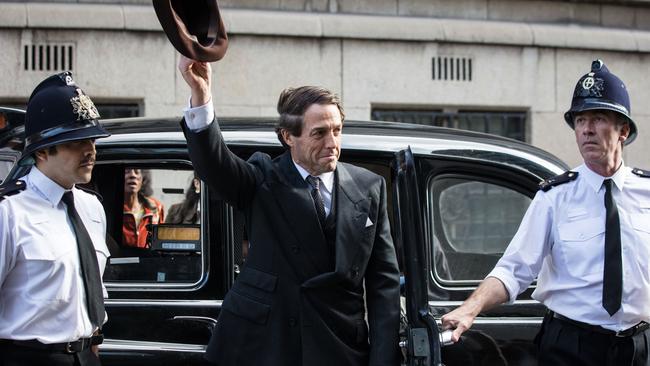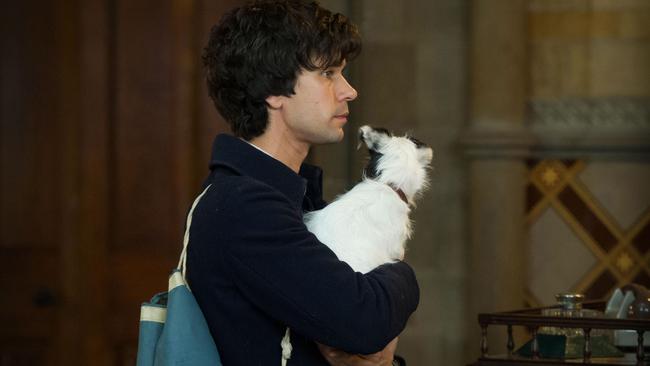A Very English Scandal: Hugh Grant as Jeremy Thorpe, Ben Whishaw
The Thorpe affair had it all: powerful politicians, gay lovers, a murder plot … even a dead dog.

Russell T. Davies’s new drama A Very English Scandal, directed by the illustrious Stephen Frears, is adapted from the “nonfiction novel” by John Preston and tells the true story of the 1970s Thorpe affair, the political and sex scandal that ended the career of Jeremy Thorpe, leader of Britain’s Liberal Party.
Hugh Grant is Thorpe and Ben Whishaw is his lover Norman Scott, and, as Davies says, his three-part series is really about why powerful men do the things they do, “why they do the wrong things at the wrong times and how they can live with themselves”.
It’s not only beguiling, beautifully acted — Grant and Whishaw have never been better, heartbreakingly brilliant in fact — written and directed, but it carries a heavy if entertaining freight of contemporary resonance.
As Davies told New Statesman: “Living in the world as a gay man is a political act … the American elections roll around, you literally have genuine, honest Republican candidates sitting there talking about locking us up in camps.”
The press dubbed it “the trial of the century” when Thorpe, the talented, charming and flamboyant politician who led the resurgent Liberal Party in the 1970s, faced a potentially lengthy jail sentence for the very serious crime of conspiring to murder a former lover, Scott.
It was a scandal that erupted following a bungled shooting on Exmoor in October 1975, when airline pilot Andrew Newton lured Scott to the moor, produced a gun and shot his dog, the gun jamming before he could shoot Scott. After revelations in the press about his friendship with Scott, Thorpe was forced to resign from the Liberal Party leadership in May 1976. He lost his North Devon seat at the May 1979 general election, then stood trial at the Old Bailey in a case that had Britain spellbound, the dead dog a crucial part of the story.
“This story has been told quite a lot of times, but I don’t think it has ever in any mainstream form [been] told by a gay man,” says the proudly gay Davies, who also created Queer as Folk and was responsible for the hugely successful reimagining of Doctor Who. “There are a lot of moments within this where I thought: ‘Actually, I have insight.’ I thought: ‘I can see where Jeremy Thorpe is coming from there, I can see where Norman Scott is coming from there. I can actually bring that experience to it and understand why these men did what they did.’ ”
The writer Davies most admires is Charles Dickens. “It’s that size of character — huge and baroque and exaggerated and full of catchphrases and habits: that’s real life as far as I’m concerned.” There’s certainly something a little Dickensian about his work here, the vivacious world he creates, a landscape populated with often hilariously extreme characters, his people funny and dangerous at the same time. We’re often so beguiled by the conjuring tricks of his storytelling that the emotions are taken unawares.
Davies’s script segues neatly between comedy and tragedy, leaning slightly towards the farcical all the way. Murray Gold’s original music at times is like a Benny Hill soundtrack, suggestive too of an Ealing comedy caper; it is rarely absent but is sombre and fateful where appropriate.
“It had to be comic and it had to be dramatic,” Frears says bluntly of the tone he was trying to achieve, a kind of delicate balance. “Is it too funny? Is it not funny enough? All of the usual things. But that was the pleasure of it — to get that balance right. I hope the films are very funny and I hope that they’re very dramatic. You want to know what happens next. It is the most ludicrous story. You can’t believe the incompetence.”

The first episode starts drolly indeed, Thorpe meeting with his best friend and confidant Peter Bessell (Alex Jennings) where they blithely chat about their sexual proclivities: Bessel, though sleeping with his secretary, admits to chasing boys; Thorpe saying he’s “only 20 per cent for the ladies”. It was a dangerous time. While 1957’s Wolfenden report recommended “homosexual behaviour” between consenting adults in private should no longer be criminalised, it would be some time before the British parliament was ready to consider the issue in earnest. Gay men still were treated with disgust, ridicule or pity. (Davies wittily entwines the story of the 1967 bill that decriminalised homosexuality and the resolution it took for MPs and peers to champion it.)
As Thorpe eyes the bottom of a young waiter, Bessell warns his friend: “Be careful, I don’t think any boy’s worth ending up in prison for.” The warning echoes through the next 50 minutes after Thorpe tells Bessell he is being blackmailed by a former lover, a stable hand called Norman Josiffe (Whishaw), later changed to Scott, who had sent a letter to Thorpe’s mother demanding £17. “He can’t even blackmail properly,” Thorpe says disdainfully, but nostalgically admits: “When I first met him, he was very heaven.”
We go back in time to 1962 and see how the affair begins, Scott then 21, suffering from severe depression and fresh out of a psychiatric hospital. Things sour after Scott arrives in London carrying a suitcase and a small dog, quickly becoming a cloying annoyance to his older lover after Thorpe finds him digs, pays his rent and buys him expensive clothes. Scott becomes unhappy and discontented, and finally vengeful. “You have infected me, Jeremy, with the virus of homosexuality,” he shouts as their relationship collapses.
Thorpe’s career goes from strength to strength as he becomes Liberal Party leader but Scott is the secret that won’t go away. Thorpe’s anxiety becomes an obsession, despite the many efforts made by Bessell on his behalf to silence the young man. The situation is not helped by Thorpe’s inclination to have sent Scott compromising billets-doux on House of Commons notepaper and his constant refusal to sort out recurring problems with Scott’s National Insurance card, without which he is unable to work. Both the letters and the card become almost running gags in the script and the source of wonderful dark humour and a touch of slapstick. There’s a wonderful scene halfway through that perhaps best illustrates the creator’s considered approach to the farce of the affair and its tragic elements.
Bessell consults Lord Arran, played in high style by David Bamber, an eccentric Conservative politician known as “Boofy” who is trying to decriminalise homosexuality. He and his wife, the irrepressible Countess of Arran (Susan Wooldridge), a famous powerboat racer, are obsessed with badgers who have the run of the manor, with guests asked to wear gumboots to avoid being bitten on the ankles. It’s like a Peter Cook sketch. But the tone changes when Arran reveals the reason for his mission: his gay brother, “queer as springtime” according to the countess, killed himself, and he’s determined to save other men from the fear of being outed.
Then there’s Thorpe’s seduction of Scott. A brief kiss. Then suddenly he’s a predator.
As the narrative accelerates — Davies skilfully uses flashbacks, often almost like exaggerated revue sketches, with a lovely comic crispness about them, to rapidly fill in backstory — Scott spirals out of control while Thorpe gets married and has a child in the belief it will help his standing with the public. Scott must be stopped and Thorpe talks with Bessell about murder, bedevilled by the apprehension of the ruin that would accompany exposure. “If anything about me ever became public, I would put a gun to my head and blow my brains out,” he states. “Then I shall protect you,” Bessell replies.
“It’s never a story that goes away,” Davies says. “It’s also a bit of a piece of history. But when you think of the madness of the White House now and the madness in Downing Street, it’s like we never have enough of these stories. Men in power lie, have sex — add a dead dog and you’re away.”
A Very English Scandal, Thursday, 8.30pm, BBC First.


To join the conversation, please log in. Don't have an account? Register
Join the conversation, you are commenting as Logout